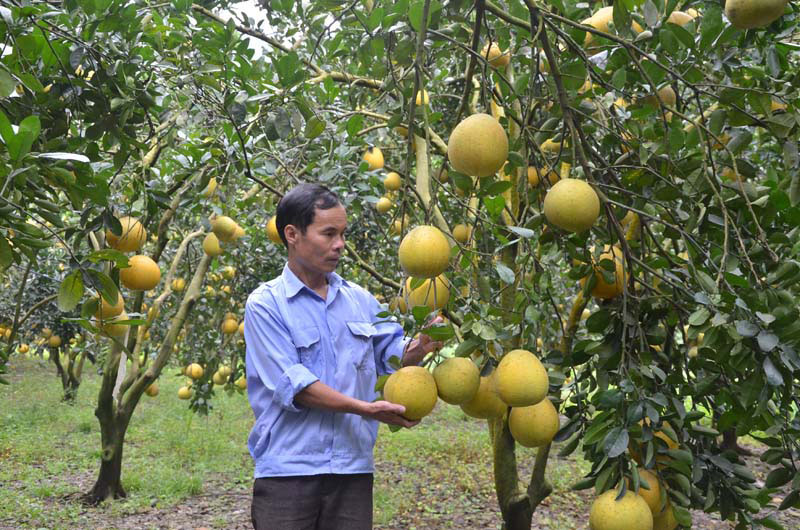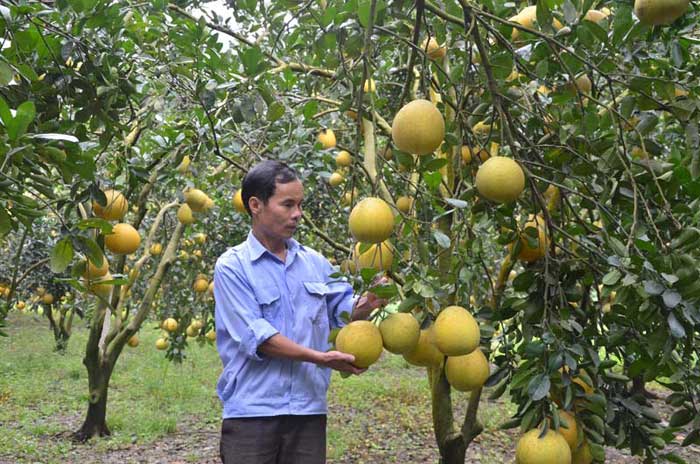
(HBO) With more than 100 original pomelo trees, the family of Mr. Bui Van Nong, the Vice Chairman of Bac Son’s (Kim Boi) Farmers’ Association collected 20 million the first harvest. Last year, the second year, his family earned 80 million. In 2018, the pomelo garden brought the family the income of 110 million VND. Mr. Nong's family is one of many households in the commune having income of 100 million VND per year thanks to Dien pomelo trees.

With nearly one thousand Dien pomelo trees,
the family of Mr. Bach Cong The in Kha Tren village has an income of over 1
billion VND.
Bac Son has strongly transformed the area of
unstable rice cultivation into seedlings such as bitter melon, pumpkin, melon
and so on to gradually increase the production value on one cultivated area. As
a result of this, the per capita income has improved, contributing to the
effective implementation of hunger eradication and poverty reduction, and step
by step helping Bac Son out of the extremely difficult communes. After that
time, the Party Committee of the commune continued to issue a resolution on the
restructuring of plants and animals.
Accordingly, the commune’s Party sub-branches
have consulted with other Party members and the masses to apply and bring
high-value plants and animals into production. In particular, Dien pomelo trees
are chosen by the majority of people. Having identified the new directions,
many households have focused on changing the mixed garden, unstable one-crop
land area of rice into growing Dien pomelo trees. Initially, only Mr Bui Van
The's family living in Kham Tren village invested in converting nearly 1
hectare of garden land, fields and poorly paddy fields into growing Dien pomelo
trees. After that, many households, mainly in Khe village, in the commune
studied and followed. Out of 786 households in the commune, there are more than
300 Dien pomelo growers with the total area of over 60 ha. But for the family
of Bui Van The, Bui Van Thanh's Bui Van
Dieu’s families have also expanded the pomelo tree area, initially bringing
high economic efficiency.
Mr. Bui Van Dieu's family in Khanh village
was once in a difficult situation but they bravely borrowed money to invest in
planting pomelo trees. With more than 100 pomelo trees, his family’s annual
income is more than 100 million VND. After 3 years, the income from pomelo
trees has helped his family pay off debts, and the life is step by step
increasing.
According to data from the Hoa Binh Provincial Party Committee, the industrial production index for the first six months of 2025 is estimated to have increased by 20% compared to the same period last year. This marks the highest year-on-year growth rate for this period since 2020.
In the first six months of 2025, Hoa Binh province’s export turnover was estimated at 1.145 billion USD, marking an 18.11% increase compared to the same period in 2024. Import turnover was estimated at $ 804 million, a 17.15% increase, which helped the province maintain a positive trade balance.
The lives of the ethnic minority farmers in Tan Lac district have gradually improved thanks to the new directions in agricultural production. This is a testament to the collective strength fostered through the professional associations and groups implemented by various levels of the district’s Farmers’ Union.
With the motto the "product quality comes first,” after nearly one year of establishment and operation, Muong village’s Clean Food Agricultural and Commercial Cooperative, located in Cau Hamlet, Hung Son Commune (Kim Boi district), has launched reputable, high-quality agricultural products to the market that are well-received by consumers. The products such as Muong village’s pork sausage, salt-cured chicken, and salt-cured pork hocks have gradually carved out a place in the market and they are on the path to obtaining the OCOP certification.
In the past, the phrase "bumper harvest, rock-bottom prices" was a familiar refrain for Vietnamese farmers engaged in fragmented, small-scale agriculture. But today, a new spirit is emerging across rural areas of Hoa Binh province - one of collaboration, organisation, and collective economic models that provide a stable foundation for production.
Maintaining growing area codes and packing facility codes in accordance with regulations is a mandatory requirement for agricultural products to be eligible for export. Recently, the Department of Agriculture and Environment of Hoa Binh province has intensified technical supervision of designated farming areas and packing facilities to safeguard the "green passport" that enables its products to access international markets.



